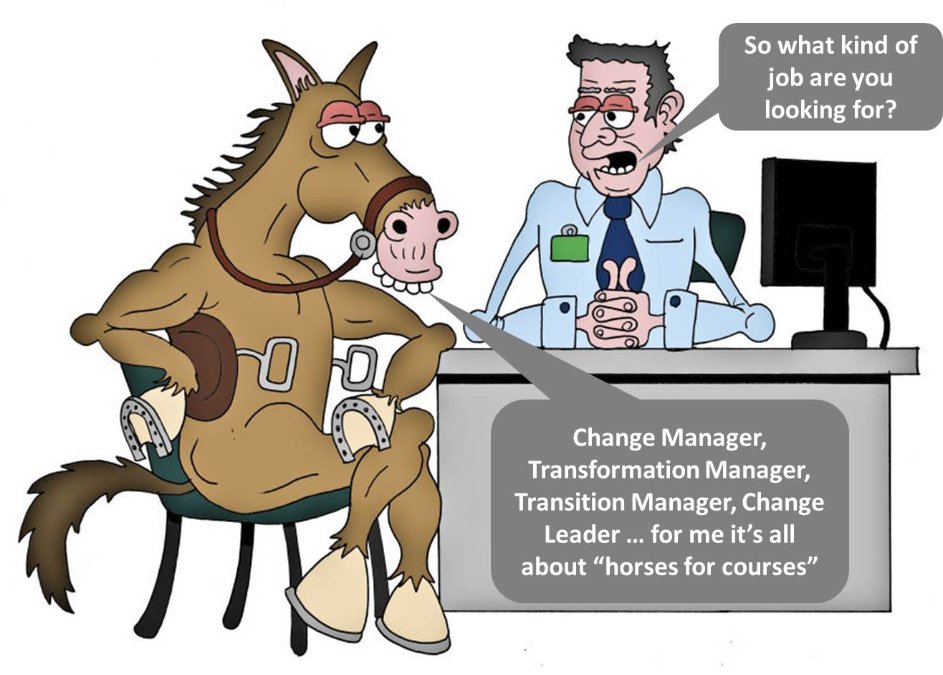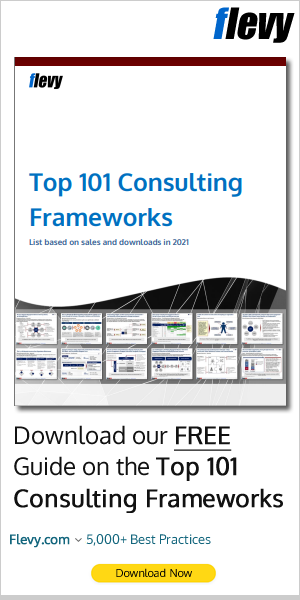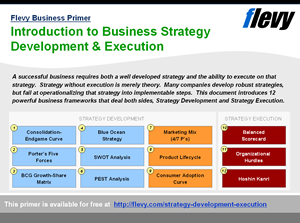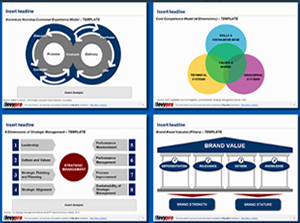Editor's Note: Take a look at our featured best practice, Change Management Strategy (24-slide PowerPoint presentation). Seventy percent of change programs fail, according to the April 2001 Harvard Business Review article, "Cracking the Code of Change". According to Bain & Company, businesses that implement fast, focused, and simultaneous change programs can create enormous and long-lasting shareholder [read more]
Is the Term Change Management Still Relevant?
Also, if you are interested in becoming an expert on Change Management, take a look at Flevy's Change Management Frameworks offering here. This is a curated collection of best practice frameworks based on the thought leadership of leading consulting firms, academics, and recognized subject matter experts. By learning and applying these concepts, you can you stay ahead of the curve. Full details here.
* * * *

I have published many of my previous articles, because the issues I have tackled all seem to be the subject of continuing debates on LinkedIn and this one is no different. In my article called Project Management vs Change Management, I said Change and Change Management are widely recognised terms, but unfortunately misunderstood ones… therein is probably the subject of another article.
So, here is that article.
First of all let’s go with a few definitions (as usual) but I am not going to quote some of the better known sources; e.g. Prosci rather I have chosen some lesser known sources at random:
- From a “Happy Manager” article — Adopting processes for managing change that are appropriate to the nature, characteristics and context of the change being managed, that take people with you and are focused on achieving successful outcomes.
- From a “Tech Target” article — Change management is a systematic approach to dealing with change, both from the perspective of an organization and on the individual level.
- From a “Mind Tools” article — Change management is a structured approach for ensuring that changes are thoroughly and smoothly implemented, and that the lasting benefits of change are achieved.
- And finally from “Practical Management Skills” they offer a definition of both “Change” and “Change Management” —
- Change … the process of moving from the current state to a vision of the future.
- Change Management … managing this transition from the old position to the new.
It seems that although they all define the term differently, they all have essentially the same/similar message:
- Moving from Old to New.
- Achievement of Success and Benefits.
- People and Individuals.
- Structured and Systematic.
Expanding on the last bullet, the Change Management “NO” fraternity will argue that–yes, you guessed it–change cannot be managed! Well, I kind of agree and disagree. Why? Because:
- You can manage all of the following which can be included in a plan and have associated timescales and deliverables:
- Stakeholder Engagement.
- Communications.
- Process Change.
- Organisational Change.
- Business Readiness and Adoption Monitoring.
- Training.
- What you cannot manage and include in a plan and have associated timescales and deliverables for (but will clearly impact them) is:
- Change Resistance.
- Corporate Culture.
- Business Readiness.
- Leadership Styles.
NOTE: It is arguable that these should form part of a Change Management Risk plan!
So for me, there are two sides of Change Management… the hard side and the soft side. Whether these can be managed by a single individual is the key issue. I have made my view on this subject abundantly clear in the PM vs CM post I referred to earlier.
But let’s move on to the wider debate of what can we replace the term with!
There are those that argue their case for Change Leadership… 900,000 + hits on Google by the way.
Forbes published an article by John Kotter in 2011 called Change Management vs. Change Leadership — What’s the Difference? in which he distinguishes between the two:
- Change Management is a set of processes and a set of tools and a set of mechanisms that are designed to make sure that when you do try to make some changes, A, it doesn’t get out of control, and B, the number of problems associated with it—you know, rebellion among the ranks, bleeding of cash that you can’t afford–doesn’t happen. So it is a way of making a big change and keeping it, in a sense, under control.
- Change Leadership associated with putting an engine on the whole change process, and making it go faster, smarter, more efficiently. It’s more associated, therefore, with large scale changes.
Interesting that he differentiates between the two yet I think he is also saying that the two go hand-in-hand … that’s my take anyhow.
Then there are those that would go with Transformation Management (note the use of the word management). Just let’s complicate matters for a short while by referring you to the following article in The Change Leader’s Network in which they talk about:
- Developmental Change.
- Transitional Change.
- Transformational Change.
Started to get a headache yet? Yes? Good!
And just to make matters worse let’s talk about Transition Management which the Business Dictionary explains as the “Systematic planning, implementing, and monitoring change in an organization.”
Wait a minute have we now turned full circle because we are talking about change again!
Sometimes I associate things with music and all of a sudden I have started singing the Beatles song “Help” in my head … note the use of the word “changed” in the lyrics! Sorry a slight digression… let’s continue.
So we have Leadership, Change, Transformation and Transition. It is interesting when you run these words through the “MS Word” Thesaurus:
- Leadership – management, control, guidance, headship, direction, governance.
- Change – alteration, modification, variation, transformation, revolution, conversion, adjustment, amendment, difference.
- Transformation – alteration, change, conversion, revolution, renovation, makeover.
- Transition – change, changeover, evolution, conversion, shift, move, switch, alteration, modification.
What this tells me is that Change, Transformation and Transition really all mean the same thing but Leadership is a bit different although you will note the words management, control and direction.
Finally …
I think I may have used this phrase before … “horses for courses”. That to me sums up this whole debate. If you, or an organisation, feel comfortable with the words Change Management then what the hell, carry on using it. Equally so for the words Leadership, Transformation and Transition!
Me, I am a Change Manager, always have been and always will be but I can be a leader and I can also get involved in transformation and transition work.
In reference to the term Change Management, another Beatles song has just come into my mind … “Let It Be.”

Want to Achieve Excellence in Change Management?
Gain the knowledge and develop the expertise to become an expert in Change Management. Our frameworks are based on the thought leadership of leading consulting firms, academics, and recognized subject matter experts. Click here for full details.
"The only constant in life is change." – Heraclitus
Such is true for life, as it is for business. The entire ecosystem our organization operates in—our customers, competitors, suppliers, partners, the company itself, etc.—is constantly changing and evolving. Change can be driven by emerging technology, regulation, leadership change, crisis, changing consumer behavior, new business entrants, M&A activity, organizational restructuring, and so forth.
Thus, the understanding of, dealing with, and mastery of the Change Management process is one of the most critical capabilities for our organization to develop. Excellence in Change Management should be viewed as a source of Competitive Advantage.
Learn about our Change Management Best Practice Frameworks here.
Readers of This Article Are Interested in These Resources

|
|
286-slide PowerPoint presentation
|
|
73-slide PowerPoint presentation
| |||
About Ron Leeman
Ron Leeman has been involved in “change and process” work for more years than he cares to remember. He has worked extensively across the UK, Europe, and globally--and has an enviable track-record of delivering organisational change and process initiatives across a wide cross section of industry sectors. In 2012, Ron was bestowed with a “Change Leader of Tomorrow” award by the World HRD Congress “in recognition of my remarkable progress in initiating changes enough for others in the same industry to follow my example”. Ron is firm believer in knowledge transfer and now wants to share his vast knowledge with those who are considering getting into or at various stages of “change” and/or “process” work or those working on specific Projects wanting to gain practical insights into “how to” type situations. You can connect with Ron Leeman on LinkedIn here, where you can view his 85+ Recommendations and in excess of 800 Endorsements from clients and co-workers alike to give you an indication of the quality of service that he has provided and can offer. Ron is also a document author on Flevy. Browse his frameworks on Change Management, Process Analysis, and Program Management here: http://flevy.com/seller/highwayofchange.
Top 10 Recommended Documents on Change Management
» View more resources Change Management here.
» View the Top 100 Best Practices on Flevy.













